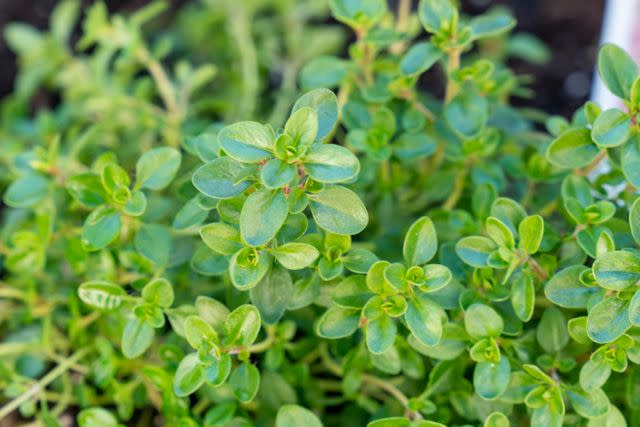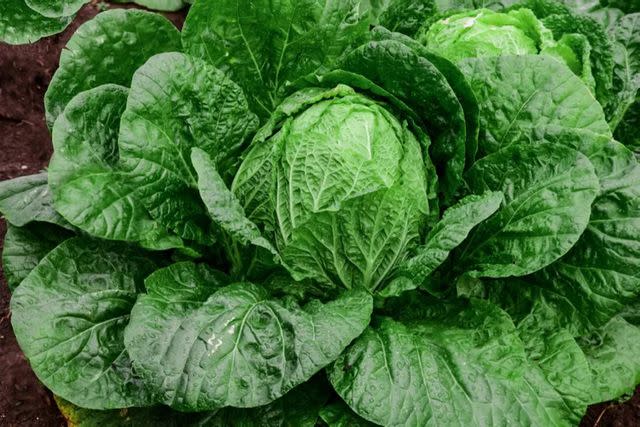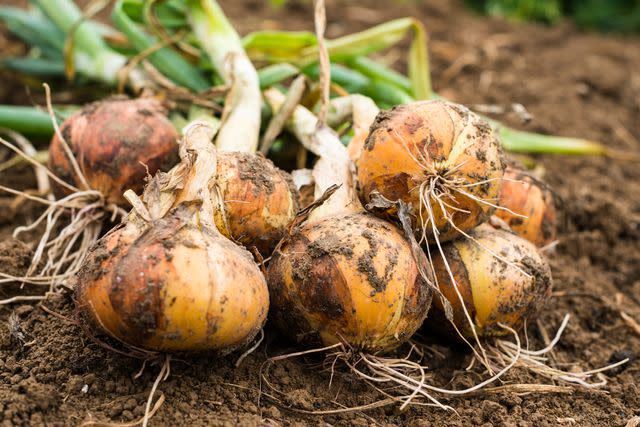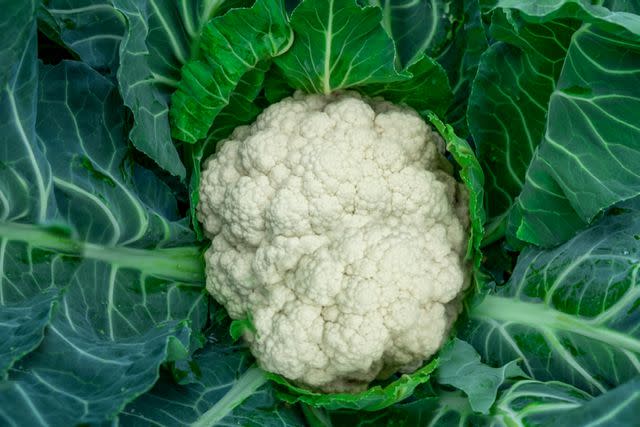25 Best Companion Plants for Rosemary (and What Not to Plant)

The Spruce / Randi Rhoades
Planting rosemary brings many perks to your garden. Not only is rosemary a delicious herb to grow, but it also benefits its companion plants as well—if you plant the right ones.
Rosemary has a strong scent that acts as a natural pest repellent for its companioning plants. This herb also enhances the flavor of others planted nearby thanks to its release of aromatic compounds. As a result, other plants in your garden, like vegetables and fruits, grow healthy and strong for you to enjoy (instead of insects).
If you're looking to grow your garden, here are the 25 best rosemary companion plants to start with.
Companion Planting and Its Benefits
Companion planting is all about maximizing space in your garden by planting crops nearby that have similar needs. Though you can plant a variety of different plants, they all work together to provide benefits such as preventing diseases, insect infestations, and improving soil quality.
The benefits of companion planting are purely based on longtime gardeners' observations. These are just recommendations, but it could be trial and error in your garden to see what prospers growing next to rosemary. Rosemary plants prefer sunny conditions and drier soil, so plants that need more shade or water might not work.
Lavender

The Spruce / Adrienne Legault
Since they both have Mediterranean roots and maintenance needs, lavender makes a great companion for rosemary. Both herbs love to bask in warm environments with full sun exposure and well-draining soil. With the well-drained soil, rosemary and lavender companion gardens only need to be watered about once a week.
Alyssum

Wirestock/ iStock/ Getty Images Plus
Rosemary is compatible with nearly any type of flower, but what makes alyssums more special are the insects they attract. The white flowers of the alyssums attract pollinators while the pungent scent of the rosemary repels pesky insects to keep them from feeding on the stems or leaves. In turn, you get a pollinated garden full of this gorgeous bright color.
Sage

Getty Images / Bonnie McCann
If you're looking to grow more of an herb garden, the good news is that other herbs, like sage, make some of the best rosemary companion plants. Rosemary and sage have the same growing requirements, but rosemary plants have the ability to intensify the health and flavor of sage, giving you an easy-to-maintain garden full of flavor.
Thyme

The Spruce / Almar Creative
Thyme is another herb to plant with rosemary in your garden as a companion plant. Not only do these two herbs go together in your meals, they also go together to protect your garden with their attributes.
Rosemary repels insects from feasting on your plants while thyme acts as a cabbage worm deterrent. Meaning, your garden doesn't have to worry about being invaded, especially if you're planting cabbages too. Thyme also has Mediterranean roots, which means soil and environment needs are the same as rosemary.
Oregano

The Spruce / Kara Riley
Keep your garden full of flavors with companion plants that are easy going and follow the same maintenance plan. Oregano is a great herb to use as a companion for rosemary with their mutual properties of enjoying full-sun exposure, well-drained soil, and ease in growth. Another perk to planting oregano is that it's low-growing and will protect your top soil from erosion.
Marjoram

Getty Images / scisettialfio
Marjoram provides a lot of benefits to your garden as a companion plant with rosemary. Other than building more flavors into your outdoor garden, this herb releases specific chemicals into the soil to promote faster plant growth and the flavor enhancement of surrounding vegetable plants.
Borage

Getty Images / naturaltexture
This beautiful starflower herb can be planted as a companion plant for rosemary since it's growing needs are relatively the same. Borage flourishes in well-drained soil that's slightly moist, so it doesn't need an overwhelming amount of water that could cause your rosemary to drown.
Chives

The Spruce / Randi Rhoades
Chives are universally beneficial herb that can be planted with most plants and vegetables, rosemary included. These flavorful herbs also enhance the flavors of other plants they're planted with, but most importantly, they also keep insects like aphids out of your garden for a pest-free zone.
Marigolds

Getty Images / Ravinder Kumar
Whether you want to add a pop of color to your garden or double up on your protection, marigolds are great rosemary companion plants. Their strong scent repels certain bugs like flies and mosquitos—even wasps—on top of the repellent qualities of rosemary.
For this, marigolds are great to include in your garden with rosemary to keep vegetable plants off-limits to pesky insects while adding livelihood with their colorful hues.
Zinnia

The Spruce / Lacey Johnson
Add even more color and pollinators to your garden with the help of zinnias. Zinnias are one of the best rosemary companion plants since they thrive in the same growing conditions and attract the right pollinators to help your garden flourish.
Cabbage

The Spruce / K. Dave
Interested in starting an edible garden? Some of the best rosemary companion plants are vegetables in the cruciferous category, like cabbage. With rosemary's repellent abilities, cabbage moths and worms stay clear of your garden so your veggies can grow healthy and strong.
The scent of the rosemary masks the cabbage scent that attracts the bugs so not only will you get a pest-free garden, you'll have a good-smelling garden too.
Beans

Getty Images / brytta
Beans are other plants you can use as companion plants with rosemary. Bean plants are nitrogen-fixing plants, which improve the soil to provide healthier growth for your rosemary plants.
Just like cabbage, beans attract specific pests like a Mexican bean beetle, but when planted next to rosemary, the scent of the plants is masked to deter bugs.
Carrots

Getty Images / Dimitrie Ragar
If you haven't guessed by now, rosemary is largely used to infuse flavor in your garden and mask scents for healthier crops. The trend continues for carrots.
Plant carrots as companions to your rosemary for an edible garden free of carrot flies so you can bring more fresh, homegrown veggies to your table.
Though carrots enjoy well-drained soil too, these plants need more water. Since rosemary doesn't have to be watered as often, they work best when planted on the ends of carrot rows.
Peppers

Getty Images / Vasin Hirunwiwatwong
Peppers are delicious vegetables to grow, but us humans aren't the only ones that think so. Peppers are prone to being invaded by aphids, spider mites, and other pests until rosemary plants come and save the day. Plant rosemary at the base of your pepper plants to repel insects and keep moisture retained in the soil.
Strawberries

Getty Images / Helaine Weide
Is there anything better than growing your own strawberries? Strawberries love to be planted with companion plants like rosemary that intensifies the flavors of the sweet fruits and repels insects that love them too. Rosemary is a great companion for strawberries since they both improve soil fertility and strawberries squash weed growth so rosemary plants can thrive.
Blueberries

Getty Images / YelenaYemchuk
Enjoy the taste of homegrown blueberries by making them one of your companion plants for rosemary. These two plants require the same well-drained, slightly moist soil, which makes maintaining your garden a breeze. Plus, thanks to the natural repellent provided by the rosemary, your blueberries will stay pest-free for only you to enjoy.
Raspberries

Getty Images / GomezDavid
Similar to blueberries, raspberries love a sunny spot with well-drained soil. Because of this, rosemary makes a great companion plant not only to enhance the flavor, but keep the area blocked off from bugs.
Apple Trees

Getty Images / Mint Images
Obviously, apple trees grow much bigger than rosemary plants, but that doesn't mean they can't have smaller companions. Rosemary makes one of the best companion plants for apple trees because of it's strong scent that's unpleasing to critters looking to snack on a juicy red apple.
Cherry Trees

Getty Images / Cristi Croitoru
If you're planting some cherry trees in your backyard, make sure you plant some rosemary around the trunk as well. This tasty herb uses it's eucalyptus-like scent to confuse insects in the area by throwing off the cherry smell with something more pungent.
Brussel Sprouts

Flickr / Nick Saltmarsh
Brussel sprouts are like mini cabbages and also in the cruciferous family, so of course they're one of the best rosemary companion plants. Rosemary enhances the Brussel sprouts flavor when planted nearby, and deters certain insects from feasting on the miniature bulbs.
Onions

Getty Images / rootstocks
Almost all companions on this list uses rosemary for it's strong scent as a natural deterrent, but onions come with a repelling smell of their own. Onions are great rosemary companion plants since their shallow roots don't interfere with rosemary's deep roots, and both plants act as a deterrent for other plants in your garden.
Parsnips

Getty Images / duckycards
Also a root vegetable, these light carrot-like vegetables benefit greatly from the companion of rosemary. Rosemary infuses extra flavor into parsnips as they're growing, and provides amazing pest control to keep pesky flies at bay.
Garlic

The Spruce / K. Dave
These scrumptious aromatics make wonderful companion plants with rosemary. As if garlic bulbs weren't flavorful enough, planting them next to rosemary amplifies the flavor even more. Plus, rosemary's strong scent repels insects away on top of both herbs having the same soil needs, so no special arrangement have to be made in maintaining these two plants.
Broccoli

Getty Images / Barbara Rich
Also in the cruciferous family, broccoli loves placement near rosemary plants for rosemary's repellent features. When you plant broccoli in your garden, keep your rosemary plants in a separate container nearby since these two plants have different soil needs. Both prefer well-drained soil, but broccoli likes it's soil to be kept moist while rosemary can live on the drier side.
Cauliflower

The Spruce / K. Dave
Because of its scent, rosemary helps other vegetables in your garden, like cauliflower, to grow properly by keeping insects away.
Rosemary is more drought-tolerant than cauliflower, so these two need to be separated to a degree. The wisest placement is to put rosemary on the ends of your cauliflower rows so each plant get the appropriate amount of water.
Worst Companion Plants for Rosemary
Here are 5 plants not to use as companions for rosemary.
Basil: Though they taste good together, basil does not make a good rosemary companion plant. Basil prefers lots of moisture compared to rosemary's drier state, so their conflicting needs don't work together.
Mint: Rosemary and mint compete for space when planted together, which makes them not the best companion. Mint becomes very invasive when it begins to grow and rosemary grows up to four feet tall. Another factor is that, similar to basil, mint prefers more water than rosemary, so maintaining these two plants is a challenge.
Tomatoes: Rosemary's natural repellent works wonders in keeping pests away from your garden's juicy tomatoes, but these two don't mesh in terms of maintenance. Tomatoes require frequent watering, which would overwhelm the rosemary.
Pumpkin: Pumpkin is a mildew-prone plant and should be kept away from rosemary. With pumpkin's need for more water, any nearby rosemary can fall victim to mildew from the pumpkin plant, on top of root rot.
Cucumber: Cucumbers make bad companion plants for rosemary due to their maintenance and high nitrogen needs. Like tomatoes, cucumbers like a lot of water and a level of nitrogen in the soil that rosemary can't handle.
Read Next: Onion Companion Planting: 18 Onion Companion Plants to Grow
Read the original article on The Spruce.

